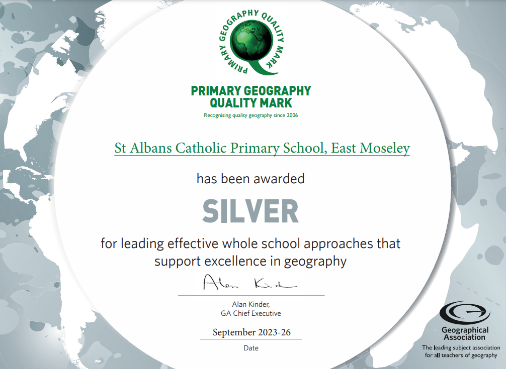Maths
We strive to ensure that mathematics learning at St Alban’s is meaningful and purposeful, with a strong focus on mastery of key concepts. We want our pupils to feel confident when using mathematics in order to enable them to make sense of the world and solve real-life problems.
Across the school, children are given opportunities to engage in practical learning using manipulatives, which are considered essential as the basis for mastery. Alongside this, the children also learn fundamental number facts and relationships which are the foundation of future learning in mathematics.
We follow Power maths - a UK curriculum mastery programme designed to spark curiosity, excitement and nurture confidence in maths. This is a child-centred lesson design that models and embeds a growth mindset approach to maths. To supplement this and in order to further meet the needs of our children, we use additional resources, for example Active maths, maths through stories, Numbots, Times table rockstars and the new EEF backed Whizz maths programme.
A range of formal and informal assessments are carried out by teachers to ensure that each child progresses at their own rate. This allows children to work towards their own personalised targets and help them become independent learners. All children have daily maths lessons, which focus on fluency, reasoning and problem solving
The use of our key instant recall facts (KIRFs) promote mental fluency and are changed each half term for each year group. The KIRF is taught alongside the curriculum and focusses on a specific key concept appropriate to each year group.
Vocabulary is key when discussing different concepts. Our staff model this and all children become confident at using mathematical language to aid discussions and understanding. Current mathematical vocabulary is displayed in classrooms to ensure that children have access to it on a day to day basis.
EYFS
We know the importance of providing practical opportunities for the children to develop and apply their mathematical knowledge to their own learning. Through exploration and play, the children are encouraged to think critically and begin to solve everyday problems through applying their learning to new experiences.
Key Stage 1
The main focus within mathematics in Key Stage 1 is to ensure that pupils develop confidence and mental fluency within whole numbers, counting and place value and also to begin to embed these skills in their problem solving. This involves working with numerals, words and the four operations.
Key Stage 2
In Key Stage 2, children continue strengthening their knowledge and understanding of the four operations and apply this knowledge in a variety of ways, solving problems and completing a variety of investigations.
At St. Alban’s we acknowledge the importance of children being able to apply mathematical knowledge to real life experiences; it is essential, therefore, that children develop strong mental maths skills to achieve this. To become confident in developing mental maths strategies, the children must know their times tables. Regular practise is planned for in the delivery of maths but we do ask that extra time is spent learning these number facts at home.






